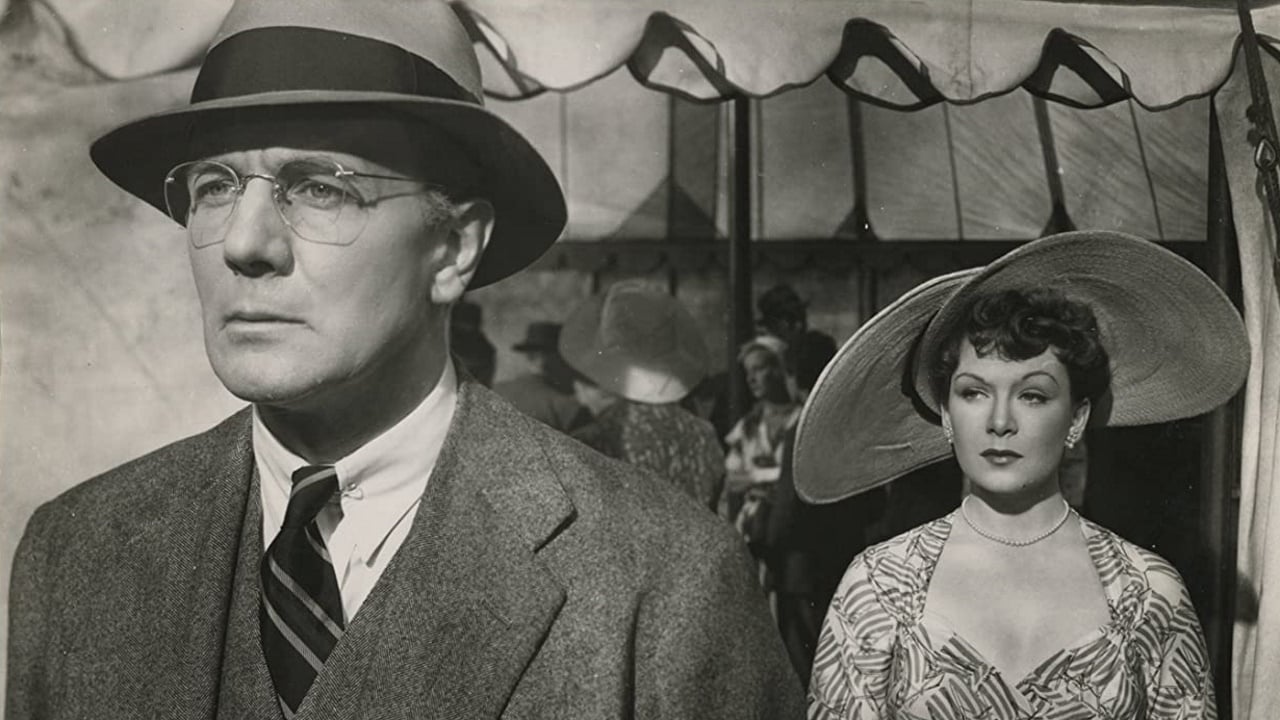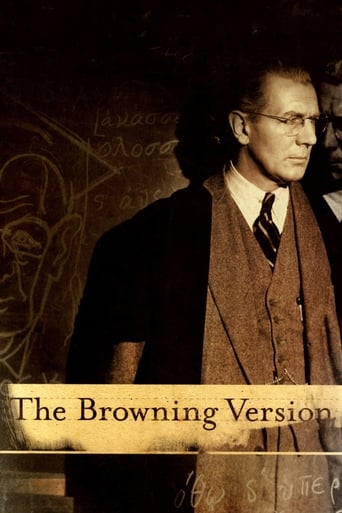

Firstly, I'm a Rattigan fan. Separate Tables (1958), although it hasn't aged well, is still one of my top ten films. I came to The Browning Vesion late, first hearing it as a radio adaptation. The radio adaptation was faithful to the theatre script in every detail and I was genuinely disappointed by the abrupt (and seemingly anti-climactic) ending when the script appeared to be heading towards a more dramatic resolution of themes. In the play the resolution is left to the imagination. The film goes beyond the play and adds the much anticipated ending. Unfortunately, for me, it didn't work. It seemed contrived and unrealistic, tacked on in an attempt to satisfy a cinema going audience. I'm sure Rattigan himself was well aware of the dilemma. Crocker-Harris' last line in the play is "An anti-climax can be surprisingly effective". While I can understand the studio's concerns I think I have to agree with Crocker-Harris and wish the film makers had had the courage to end this film on the same line.
... View MoreThis movie is quite good, though it starts off a bit sluggishly and is talky and in black and white and is a serious character study and nobody wrenches off anybody else's head amidst a fountain of gore.Michael Redgrave's performance is almost all interior. He's a cold and distant teacher at what Americans would call a prep school. The kids dislike him. He has no sense of humor, no warmth, and he's critical of their best efforts to translate Latin verse. They do impressions of him behind his back. It comes to his attention that the Headmaster has referred to him, without malice, as "the Himmler of the fifth form." He's retiring due to his health and most of his colleagues and students are happy enough to see him go. His new job will be at a less prestigious school for backward boys and will pay far less. He's not going to get a pension because, as Wilfred Hyde White, the persuasive Headmaster tells him, that would be exceptional, even after eighteen years of service at the school.The future may look a little bleak for Redgrave, but then the present and past are no gift from God either. His wife -- in a one-dimensional role -- is given to tearing him down at every opportunity and is having an affair with a science teacher. At this point I began to experience some vague redintegrations of my marriage. I almost sobbed with pity for the poor slob.Yes, he was once a brilliant scholar and began a verse translation of the Agamemnon of Aeschylus but gave up on it and apparently lost it somewhere along the way. One of his students, Taplow, discovers the lost manuscript, reads it, and gives it back to Redgrave, saying that he found it really exciting. Taplow had previously given him an inexpensive gift, a copy of Robert Browning's version of the Agamemnon, with a Latin inscription, "God favors the gentle teacher." It causes Redgrave to momentarily break down because, after all, he's starved for any kind of love. He treats the incident as a humiliation.But, knowing of his own arid performance as a teacher, and of his wife's infidelity, which is strictly sexual in nature, he gives a brief farewell speech that sounds like a confession. When the sits down, the Headmaster tries to introduce the next speaker but his efforts are eclipsed by applause. I don't know that a two-minute speech could reverse the sentiments of a hundred students and faculty, but it's an extremely touching scene.It may not seem so at first but the movie belongs to a certain sub-genre. Someone (or some group) suffers unspeakable misery with a stiff upper lip and dissolves finally in a cathartic scene. Other examples include "The Mark," "Deliverance," and Kubrick's "Paths of Glory," in which the French soldiers first laugh at a German girl in a saloon singing a simple folk tune and then are swept up in her efforts and hum tearfully along with her.The wife is a weakness. She's given no redeeming qualities, no human features. But the film belongs to Michael Redgrave and his performance is masterful. Forget the light-hearted train passenger in "The Lady Vanishes." This character is an ice sculpture that melts suddenly, completely, devastatingly when he comes face to face with himself.
... View MoreMichael Redgrave is absolutely phenomenal here. He gives a subtly powerful performance as a schoolmaster, forced to go to another school, where his workload will be lighter. He needs to do this as he has developed a serious heart condition.Redgrave is absolutely mesmerizing as the no nonsense teacher, utterly despised by his pupils for his cruelty and lack of human understanding and compassion for his charges.The man is literally obsessed with Greek translations and syntax. This is all he conveys to his pupils in his narrow-minded world. His contempt for everything and everyone is vividly depicted here in a totally memorable performance. He is equally matched by Jean Kent, who portrays his unfaithful wife.He too at the end realizes his shortcomings as depicted by his farewell speech in the assembly.
... View MoreMichael Redgrave gives one exquisite, but tightly controlled performance as Anthony Crocker-Harris in The Browning Version. The play by Terrence Rattigan has been expanded considerably from the one act, one setting play from the stage. Fortunately Rattigan also wrote the expanded version for the screen and his vision comes intact for the cinema.Given the times we're in and given what we know about both Michael Redgrave and Terrence Rattigan, I think we can now give a proper interpretation to the work. What we're dealing with is a repressed gay man in the character of schoolteacher Anthony Crocker-Harris who married because it was expected of him in the society he grew up in. When Jean Kent doesn't find any sexual fulfillment in the marriage that Redgrave is unable to provide, she does look elsewhere. Her most recent explorations have her involved in an affair with the school science teacher Nigel Patrick.Redgrave is no Mr. Chips, he's an exacting pedagogue, extremely unpopular with the kids. He's moving on to another school by mutual consent. It's this move that's causing the latest strain in the marriage of Kent and Redgrave.Kent never gets due credit for her performance. She's a highly sexed individual, bitter at the marriage she's made and looks to demean and degrade Redgrave in every way possible. God only knows what she expected of the marriage, but whatever has or hasn't happened has turned into the bitter harpy she's become. In fact even Patrick is taken aback by her viciousness.The title refers to a translation of Agamemnon by Aeschylus that Robert Browning did of the original Greek text. It's given sincerely to Redgrave by young Brian Smith, one of the few kids who feels a bond towards Redgrave. Of course Kent just simply says he's what we in America would call brown-nosing with Browning.If Terrence Rattigan were writing the play today given our times, he'd be more brutally frank and probably would be out of the closet. Even with the subtleties we can only guess at, a performance of the play today might also bring that aspect out vis a vis all the characters. Anthony Asquith gets the best performance out of the entire cast, The Browning Version is definitely one of the top five Michael Redgrave performances. Not to be missed if broadcast.
... View More